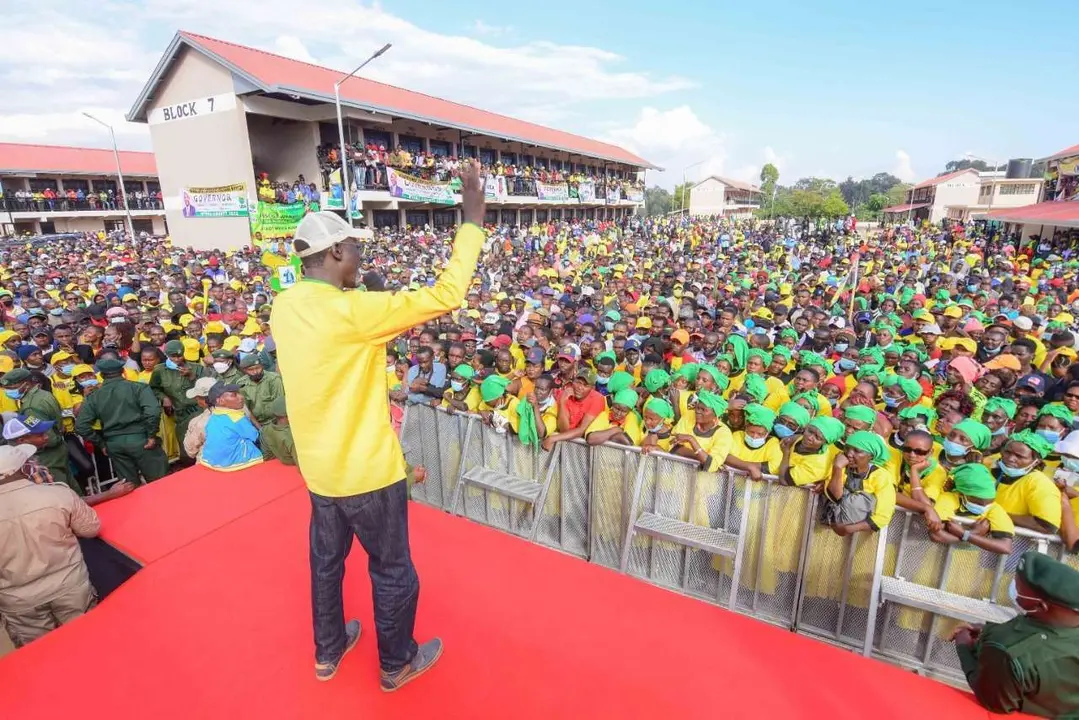Kenya stakes East African stability on its elections

Polls have been open since 6 a.m. local time. More than 22 million Kenyans are called to choose the new president of East Africa's largest economy, amid a rising cost of living and political discouragement.
Potential electoral fraud and fears of an outbreak of violence are the concerns of an election that will ensure the transition from outgoing President Uhuru Kenyatta, who has exhausted the two terms a president can run for under the Constitution.
There are four candidates to replace him, although only two have a real chance of winning and, far from presenting a new era, are familiar faces in Kenya. The most high-profile of these is 77-year-old former Prime Minister Raila Odinga, who is running for a fifth time for the country's presidency at the head of the Azimio La Umoja coalition, which means 'Aspiration for Unity' in Swahili.
Odinga is running head-to-head against the current deputy president, Wiliam Ruto, 55, leader of the Kenya Kwanza coalition, Kenya First. Behind them and unlikely to get significant votes are George Wajackoyah, promising to legalise marijuana, and David Mwaure, the anti-corruption activist cleric.
We move on; in the company of leaders @MusaliaMudavadi (ANC), @Wetangulam (Ford Kenya), Governors Mutahi Kahiga (Nyeri), @AnneWaiguru (Kirinyaga), @GovernorNanok (Turkana) and Muthomi Njuki (Tharaka Nithi), more than 50 MPs,.. pic.twitter.com/2tvQbVNMpo
— William Samoei Ruto, PhD (@WilliamsRuto) February 26, 2022
However, the duel is measured between Odinga and Ruto, which already marks a historic point: a different ethnicity. For the first time since democracy was established in Kenya in 1991, the two presidential candidates are not from the country's majority ethnic group, the Kikuyu, of which the outgoing president is a member. Odinga is from the Luo ethnic group, which has a strong presence in the west of the country, and Ruto is from the Kalenjin ethnic group, another of the country's two largest communities with support in the Rift Valley. Both candidates, however, include Kikuyu members in their ranks, aware of the ethnic importance.
And it is not only ethnicity that marks a change in these elections. It is also Uhuru Kenyatta's unexpected shift in his support for his successor, sidelining his deputy president William Ruto and backing the coalition of the opposition Raila Odinga. "I heard someone say that nowhere in the world is there a government that has united with the opposition. Kenya will be the example," Kenyatta argued. "We are mature enough to distinguish between politics and what the people need," he added.
This strong support from Kenyatta makes Odinga the favourite for the elections, and forces William Ruto to multiply his meetings to get more support. This is no small matter, given the need for both candidates to win more than 50% of the vote to avoid a run-off election. Moreover, if Odinga wins, another historic event for Kenyan democracy would be consummated, and that is that his running mate, Martha Karua, would become Kenya's first woman vice-president
❤️?❤️?❤️? pic.twitter.com/Ft3Ll9VfgP
— JUBILEE PARTY® (@JubileePartyK) February 26, 2022
"It is at moments like this that the great and powerful realise that it is the simple and ordinary people who decide in the end," Ruto told reporters after voting in the early hours of the morning. Odinga also voted later in the day, cheered by hundreds of supporters gathered at the Nairobi school.
In any case, the next president will have to face up to the serious situation the country is experiencing with the rising cost of food and fuel as a result of the Russian invasion of Ukraine in the Horn of Africa, which is combined with the drought the country is experiencing and which is leaving thousands of people on the brink of starvation. The country's huge state debt, youth unemployment and corruption among the authorities are also major challenges.
In any case, all eyes remain on the security of the elections, which are expected to be held peacefully and thus avoid what happened in the last elections in 2017, when dozens of Kenyans died in the repression of protests due to inter-ethnic clashes.
The authorities have a maximum of seven days to count the votes and announce the winner of the elections. Kenya, the democratic island in the Horn of Africa and an example for the continent, votes for its new president. East Africa looks to its future in the coming years.








